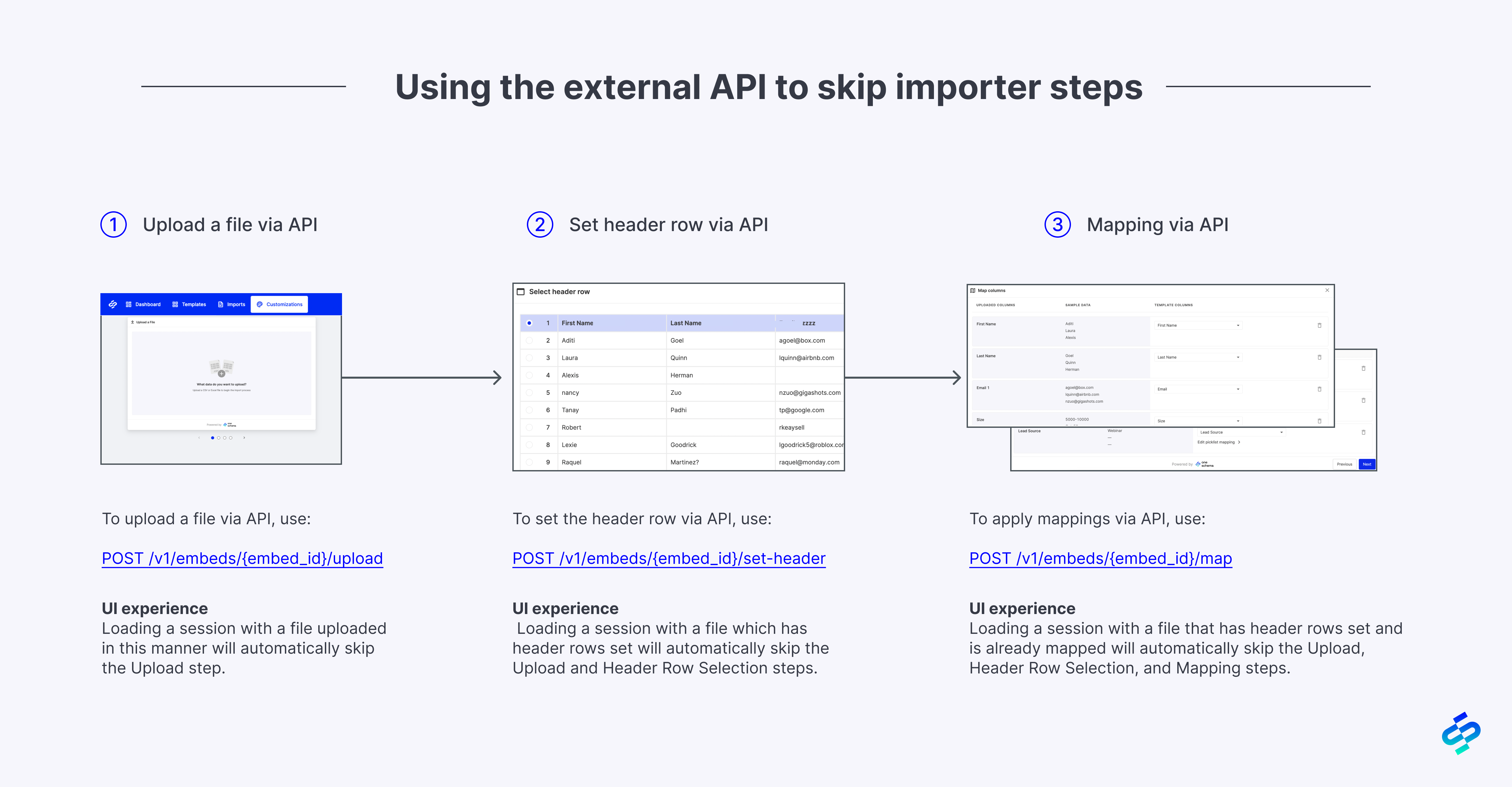Using Importer Headless
Why Initialize via API?
OneSchema's importer consists of 4 main steps: Upload, Header Row Selection, Mapping, and Review. We understand that every company's file ingestion process is unique. Perhaps you want to internally handle some portions of the import process while still using OneSchema to handle the rest of the import process. If so, initializing the OneSchema Importer via API is a great solution.
Suppose you want to support file ingestion from a third party (such as importing data directly from Salesforce). Rather than having your customer use the OneSchema UI to upload a file, our API allows your engineering team to send the data to OneSchema directly. Depending on the status of the file uploaded, the OneSchema Importer allows you to surface a subset of the 4 main steps. For example, if you want your end user to only see the Mapping and Review steps of the OneSchema Importer, you could initialize the importer by uploading a file with the header rows already set via API.
How to initialize via API?
Before we dive into using the API to import files, you need to set up few things. First, make sure you have created some templates, which dictate the validation rules for the uploaded file. Next, go through our quickstart importer flow to set up a basic OneSchema Importer. Finally, make sure you have an external api key, which will allow you to make API requests to OneSchema's servers.
Once you have all three of the above components set up, we are ready to start working with the external API. For each unique import, you will need to call the POST /v1/embeds endpoint. The return will be a JSON containing the id of the created embed as well as a session token.
Creating the embed session in this way will allow you to use our external API to skip specific steps. The embed_id must be included in the query of future API requests so that we can upload and modify the file into the appropriate instance. In order to load your importer with this session, the token must be passed into the Importer SDK (with key sessionToken) as part of the config object.
Using the external API to skip importer steps

As detailed before, there are 4 main Importer steps: Upload, Header Row Selection, Mapping, and Review. Using the external API, you can configure your OneSchema importer to skip the first 1-3 steps by making the appropriate calls.
Upload a file via API
To upload a file via API, use the POST /v1/embeds/{embed_id}/upload endpoint. Loading a session with a file uploaded in this manner will automatically skip the Upload step.
Set header row via API
To set the header row via API, use the POST /v1/embeds/{embed_id}/set-header endpoint. Loading a session with a file which has header rows set will automatically skip the Upload and Header Row Selection steps.
Mapping via API
To apply mappings via API, use the POST /v1/embeds/{embed_id}/map endpoint. You can specify an array of mappings to override OneSchema's auto-mapping. The mapping object is a tuple of sheet column identifiers (eg. column_id or column_name) and template column identifiers (eg.template_column_key). Loading a session with a file that has header rows set and is already mapped will automatically skip the Upload, Header Row Selection, and Mapping steps.
Putting it all together
Now that we know which endpoints to use to skip the desired steps in the OneSchema importer, let's walk through an example workflow. Let's assume you are trying to import data directly from Salesforce and want to skip directly to the spreadsheet UI in the Review step.
First, create an embedded session and save the embed_id, which will be passed as a path parameter to every subsequent API call. Then, you would need to call the POST /v1/embeds/{embed_id}/upload endpoint followed by the POST /v1/embeds/{embed_id}/set-header endpoint. Afterwards, use the POST /v1/embeds/{embed_id}/map to map the sheet columns to the appropriate template columns. Finally, pass the sessionToken as a parameter to your OneSchema Importer. On launch, the Importer will skip directly to the final Review step.
Updated 5 months ago
